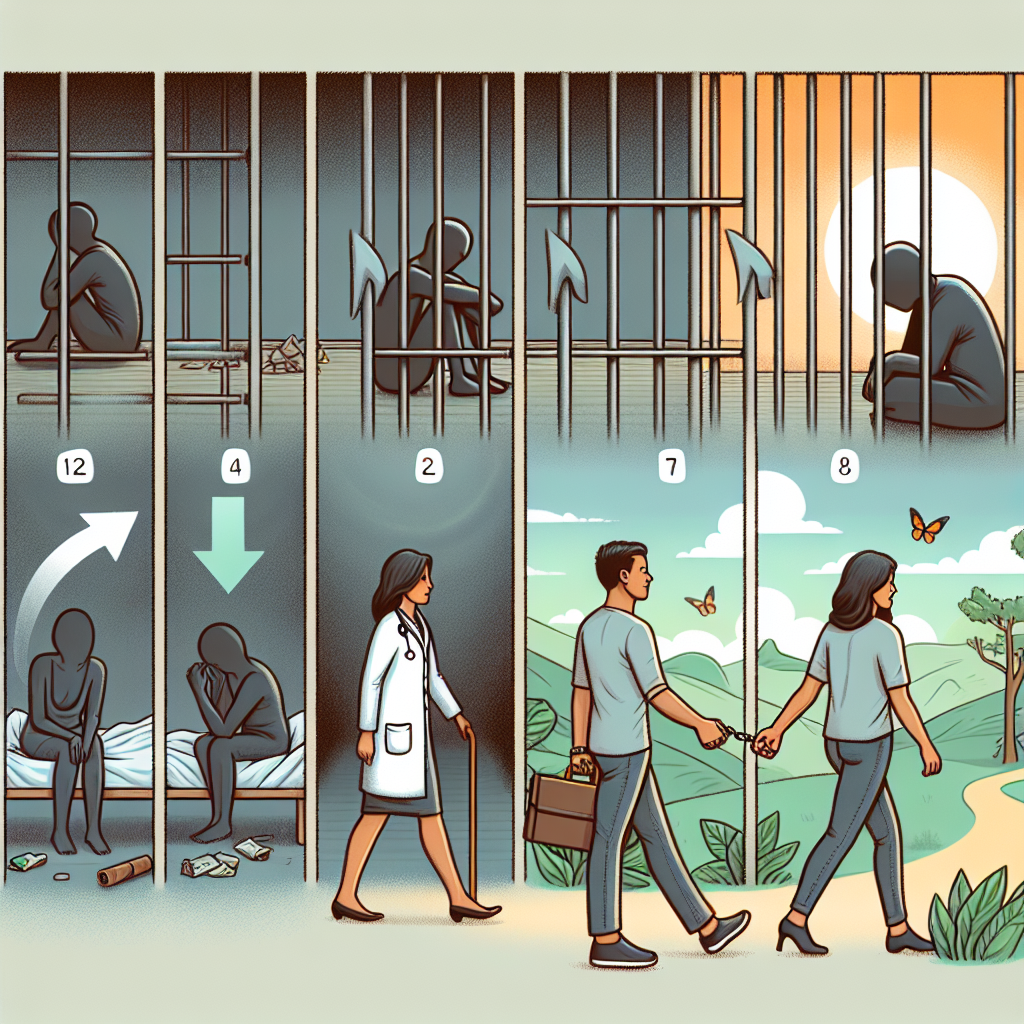-
Table of Contents

“Reclaim Your Harmony: Building a Balanced Life Beyond Addiction”
Introduction
Creating a balanced life after addiction is a multifaceted journey that involves rebuilding various aspects of one’s existence, including physical health, mental well-being, relationships, and personal fulfillment. This process requires a commitment to ongoing self-care, the establishment of healthy routines, and the development of coping strategies to manage stress and prevent relapse. By fostering a supportive network, engaging in meaningful activities, and setting realistic goals, individuals can create a stable and fulfilling life that supports long-term recovery and personal growth.
Strategies for Maintaining Sobriety and Achieving Work-Life Balance
Creating a balanced life after addiction is a journey that requires dedication, self-awareness, and a commitment to personal growth. One of the most crucial strategies for maintaining sobriety and achieving work-life balance is to establish a strong support system. Surrounding oneself with positive influences, such as supportive family members, friends, and recovery groups, can provide the encouragement and accountability needed to stay on track. These connections can offer a sense of belonging and understanding, which is essential for emotional well-being.
In addition to building a support network, it is important to develop healthy routines and habits. Structure and consistency can help create a sense of stability, which is often disrupted during addiction. Incorporating regular exercise, balanced nutrition, and adequate sleep into daily life can significantly improve physical and mental health. Exercise, in particular, has been shown to reduce stress, improve mood, and increase energy levels, all of which are beneficial for maintaining sobriety.
Another key strategy is to set realistic goals and priorities. It is essential to recognize that recovery is a gradual process and that it is okay to take small steps towards larger objectives. By breaking down goals into manageable tasks, individuals can avoid feeling overwhelmed and can celebrate their progress along the way. Prioritizing tasks also helps in managing time effectively, ensuring that there is a balance between work, personal life, and self-care.
Mindfulness and meditation practices can also play a significant role in achieving a balanced life after addiction. These techniques encourage individuals to stay present and focused, reducing the likelihood of relapse by helping them manage cravings and negative emotions. Mindfulness can also enhance self-awareness, allowing individuals to recognize and address triggers before they lead to harmful behaviors.
Furthermore, finding meaningful activities and hobbies can provide a sense of purpose and fulfillment. Engaging in creative pursuits, volunteering, or learning new skills can help individuals rediscover their passions and build a positive identity outside of their addiction. These activities can also serve as healthy distractions, keeping the mind occupied and reducing the temptation to revert to old habits.
It is also important to address any underlying mental health issues that may have contributed to the addiction. Seeking professional help from therapists or counselors can provide valuable insights and coping strategies. Therapy can help individuals understand the root causes of their addiction, develop healthier thought patterns, and build resilience against future challenges.
Maintaining sobriety and achieving work-life balance also involves setting boundaries and learning to say no. It is crucial to recognize personal limits and avoid overcommitting to work or social obligations. By setting clear boundaries, individuals can protect their time and energy, ensuring that they have enough resources to focus on their recovery and well-being.
Lastly, practicing gratitude and self-compassion can foster a positive mindset and enhance overall happiness. Acknowledging and appreciating the progress made, no matter how small, can boost motivation and reinforce the commitment to sobriety. Being kind to oneself and understanding that setbacks are a natural part of the recovery process can help individuals stay resilient and focused on their long-term goals.
In conclusion, creating a balanced life after addiction involves a multifaceted approach that includes building a support system, developing healthy routines, setting realistic goals, practicing mindfulness, engaging in meaningful activities, addressing mental health issues, setting boundaries, and cultivating gratitude and self-compassion. By embracing these strategies, individuals can maintain their sobriety and achieve a fulfilling and balanced life.
Building Healthy Relationships and Support Systems Post-Recovery
Creating a balanced life after addiction is a journey that requires dedication, resilience, and a strong support system. One of the most crucial aspects of this journey is building healthy relationships and support systems post-recovery. These relationships can provide the emotional and psychological support necessary to maintain sobriety and foster personal growth. As you navigate this new chapter, it is essential to understand the importance of surrounding yourself with positive influences and nurturing connections that contribute to your well-being.
Initially, it may feel daunting to rebuild relationships that were strained or broken during the period of addiction. However, it is important to approach this process with patience and a willingness to make amends. Open communication is key; expressing genuine remorse and a commitment to change can help mend these bonds. It is equally important to recognize that rebuilding trust takes time, and both parties must be willing to work towards healing.
In addition to repairing past relationships, forming new, healthy connections is vital. Surrounding yourself with individuals who understand and support your recovery journey can make a significant difference. This is where support groups and recovery communities come into play. Engaging with others who have faced similar challenges can provide a sense of belonging and understanding that is often hard to find elsewhere. These groups offer a safe space to share experiences, gain insights, and receive encouragement from those who truly comprehend the complexities of addiction and recovery.
Moreover, professional support should not be overlooked. Therapists, counselors, and recovery coaches can offer invaluable guidance and tools to help you navigate the ups and downs of post-recovery life. They can assist in developing coping strategies, setting realistic goals, and addressing any underlying issues that may have contributed to the addiction. Regular sessions with a mental health professional can also provide a structured environment to discuss progress and setbacks, ensuring that you remain on the path to a balanced life.
As you build these support systems, it is essential to prioritize self-care and personal growth. Engaging in activities that promote physical, emotional, and mental well-being can enhance your overall quality of life. Exercise, meditation, and hobbies that bring joy and fulfillment can serve as healthy outlets for stress and anxiety. Additionally, setting boundaries and learning to say no are crucial skills that can protect your recovery and prevent relapse.
Furthermore, fostering a sense of purpose and direction can significantly impact your post-recovery journey. Volunteering, pursuing education, or engaging in meaningful work can provide a sense of accomplishment and self-worth. These activities not only contribute to personal growth but also offer opportunities to connect with like-minded individuals who share similar values and goals.
It is also important to recognize that setbacks may occur, and that is okay. Recovery is not a linear process, and there will be challenges along the way. What matters most is how you respond to these challenges. Leaning on your support system, practicing self-compassion, and staying committed to your recovery goals can help you overcome obstacles and continue moving forward.
In conclusion, building healthy relationships and support systems post-recovery is a fundamental aspect of creating a balanced life after addiction. By repairing past relationships, forming new connections, seeking professional support, prioritizing self-care, and fostering a sense of purpose, you can lay a strong foundation for a fulfilling and sober life. Remember, recovery is a journey, and with the right support and mindset, you can achieve lasting change and personal growth.
Q&A
1. **Question:** What are some key strategies for maintaining a balanced life after addiction recovery?
**Answer:** Key strategies include establishing a routine, engaging in regular physical exercise, seeking ongoing therapy or counseling, building a supportive social network, practicing mindfulness or meditation, setting realistic goals, and avoiding triggers or high-risk situations.
2. **Question:** How can one rebuild relationships that were damaged during addiction?
**Answer:** Rebuilding relationships involves taking responsibility for past actions, offering sincere apologies, demonstrating consistent and positive behavior changes, being patient and understanding, seeking professional help if needed, and allowing time for trust to be rebuilt.
Conclusion
Creating a balanced life after addiction involves establishing a stable routine, seeking ongoing support, setting realistic goals, and prioritizing self-care. It requires a commitment to personal growth, healthy relationships, and continuous self-reflection. By integrating these elements, individuals can build a fulfilling and sustainable life in recovery.



